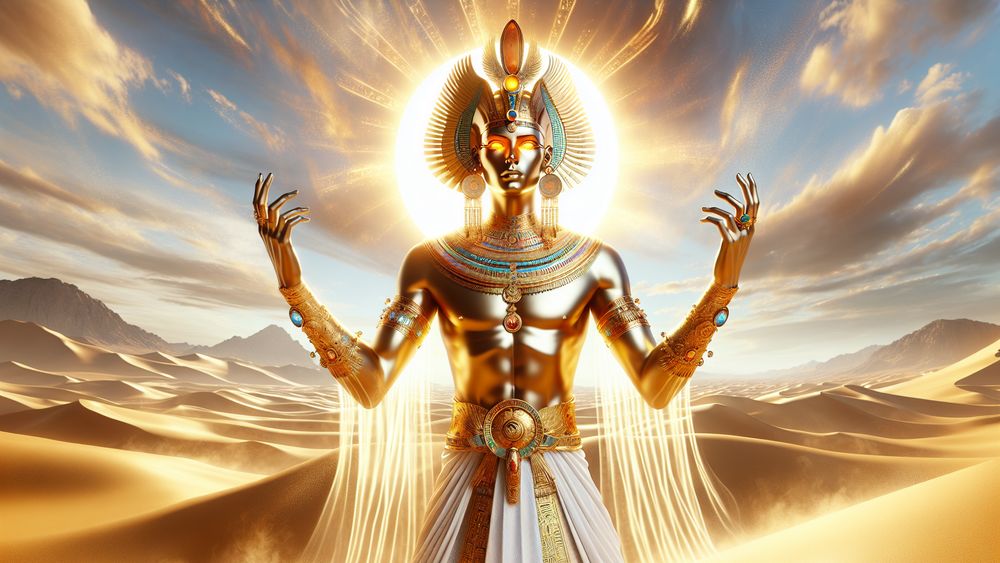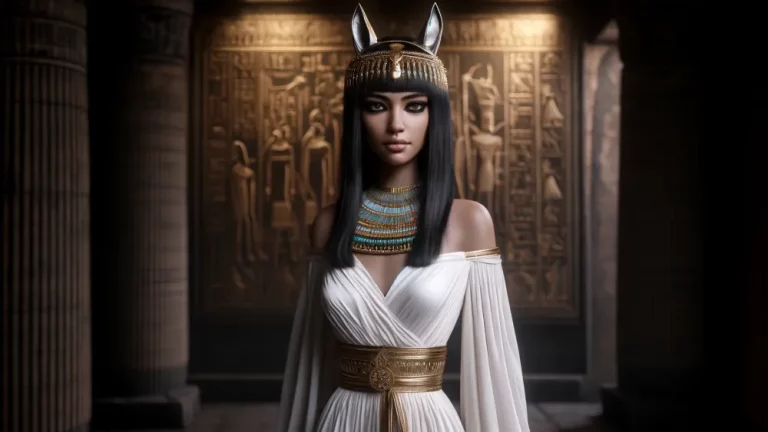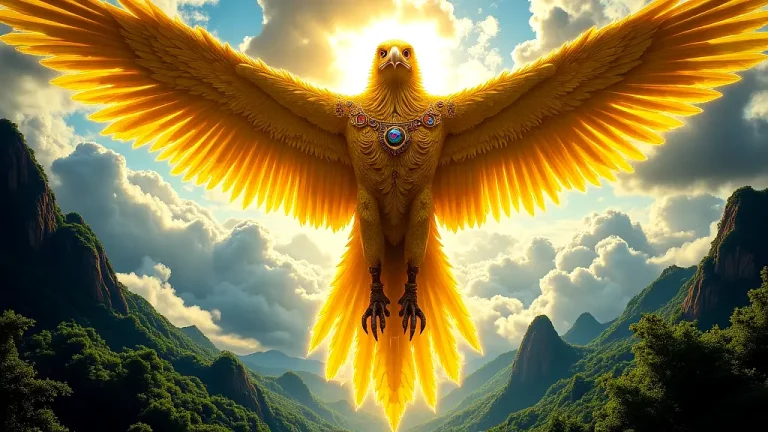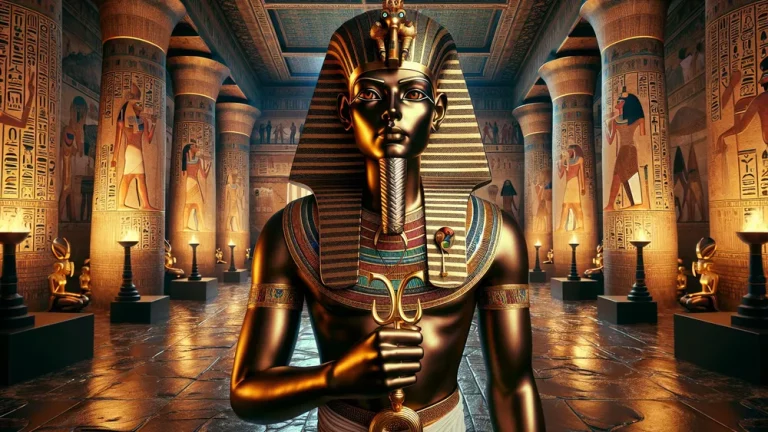Shu: Egyptian God Of Air And Sun
In the wide and complex world of ancient Egyptian mythology, which features a large number of gods and stories, Shu takes a key spot. He is the god of air and sunlight. While some may not know him as well as they do Osiris or Isis, his role is vital. He sits at the heart of the Heliopolitan creation myth.
Key Points:
- Shu is the Egyptian god of air and sunlight, essential for maintaining balance and order in the universe.
- He plays a crucial role in keeping the sky and the earth apart, which is vital for life to thrive.
- Shu’s origins lie in the Heliopolitan creation myth, where he is born from Atum and is linked to the concept of ma’at.
- Symbolized by the ostrich feather and the ankh, Shu represents air, light, and life-giving qualities.
- While there was no dedicated temple for Shu, ancient Egyptians honored him through rituals and offerings in temples dedicated to other gods.
- Shu’s influence in ancient Egyptian society is seen in art, texts, and rituals that emphasize the importance of balance and order for a prosperous life.
- In myths, Shu’s actions of separating the earth and sky and mediating conflicts between deities showcase his significance in Egyptian cosmology and society.
Here, he does something very important: he keeps the sky and the earth apart. This job of his is all about keeping everything in order, which is a big and continuous task.
By looking into where Shu comes from, what he does, and how people in ancient times showed their respect for him, we can really get into the depths of what made the religious and cultural practices of ancient Egyptians so special and layered.
The Essence and Origins of Shu
To really get where Shu fits in the lineup of Egyptian gods and goddesses, we need to kick off from where his narrative and importance first sprout.
Who is Shu?
So, let’s talk about Shu. He’s this ancient Egyptian god who’s all about air and sunlight. Think of him as super crucial for keeping the universe running smoothly. His main gig? He keeps the sky and the earth apart, which, when you think about it, is pretty essential for everything to work right.
This job of his gets a lot of attention in the Heliopolitan creation myth. It’s a story where his actions and very being are key to how the world comes into existence and stays in order. And because of this, he’s smack in the middle of Egyptian religious thinking and how they see the cosmos.
So, here’s what makes Shu a standout:
- He’s linked with air and sunlight, which literally makes life possible and affects how crops grow and how people go about their day.
- His job of keeping sky and earth apart isn’t simply for show. It speaks to a world where balance and order reign, which mattered a lot to those in ancient Egypt.
- His spot in the creation myth isn’t random. It puts him at the forefront, making him a key player in the pantheon and in how everything began.
In all this, we see Shu as someone who’s quite the figure in ancient Egyptian mythology. He’s got this role that touches on everything from the cosmic to the everyday. And that, indeed, makes him someone worth knowing about.
Shu, the ancient Egyptian god of air and sunlight, plays a crucial role in maintaining balance and order in the universe, which is essential for life and the functioning of the world according to the Heliopolitan creation myth and Egyptian religious beliefs.
The Birth of Shu and His Siblings
So, let’s talk about where Shu and his sister Tefnut come from. They’re like the first kids on the block in the big family of Egyptian gods. Their dad, Atum, he’s the top guy, decides to start a family. How? Well, by either spitting or sneezizing which is pretty unusual but that’s how it goes. This action brings Shu and Tefnut into the world. Now, this isn’t just a fun story.
It’s got a bigger job. It tells us how the very first bits of life and the rules for living right and fairly, which they call ma’at, got started. So when Shu and Tefnut show up, it’s like the universe’s grand opening. Egyptians really cared about this because it set everything in order for them.
Table: Who’s Who in Shu’s Family
| Deity | Role | Relation to Shu | What They Stand For |
|---|---|---|---|
| Atum | The Boss | Dad | The start of everything alive and kicking |
| Shu | Air Guy | Himself | Air and light which you totally need to live |
| Tefnut | Moisture Lady | Sister | Water which you also totally need |
| Geb | Earth Dude | Son | The ground and all that |
| Nut | Sky Woman | Daughter-in-law | The sky up above |
| Osiris, Isis, Seth, Nephthys | The Kids and Co. | Grandkids | Big deals in their own right for different life and afterlife bits |
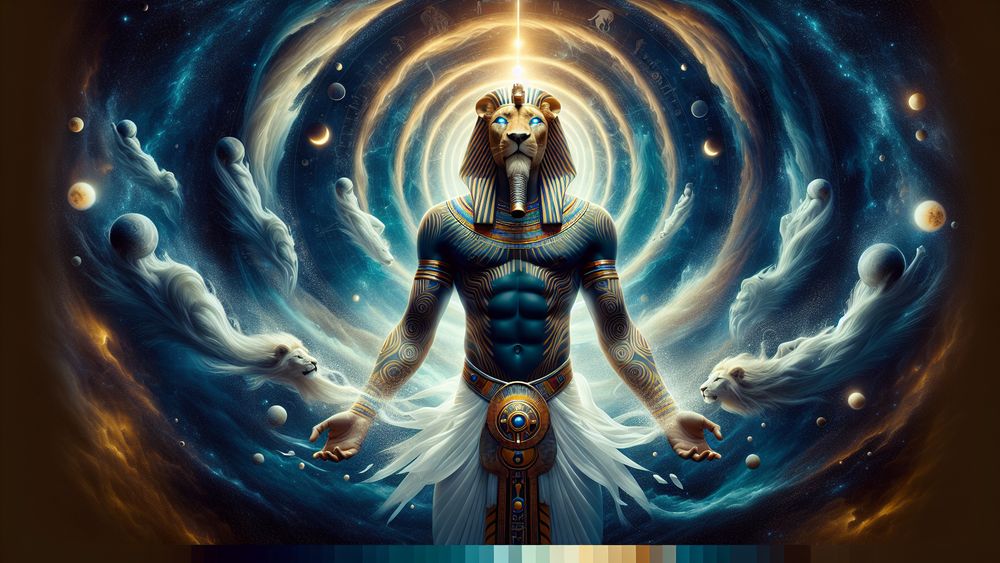
So, this table and what I’ve said before, they really show how everyone in this godly gang is connected. And they each have their own special thing that makes them matter a lot, especially when you think about Shu and where he fits into all of this. It’s like a big cosmic puzzle where every piece matters, and that’s pretty neat when you think about it.
Shu’s Role and Symbolism in Ancient Egypt
So, we’ve taken a look at Shu’s origins and his family connections before. Now, we turn our attention to what he does and the symbols that are all about him in the land of ancient Egypt.
Shu: The God of Air and the Separator of Earth and Sky
Shu takes on a key job in the lineup of Egyptian gods. His job? He keeps the sky and the earth apart. This job is super critical for making life possible. It makes room for air, which Shu is all about, and lets day and night happen. These are must-havs for growing food and for life to keep ticking in ancient Egypt. The meaning behind what Shu does is really big for the Egyptians.
It’s all about setting up ma’at, which means everything is in its right place and balance. By holding up Nut, which is the sky, and keeping Geb, which is the earth, down, Shu acts like a hero keeping chaos away and making sure everything stays balanced and orderly.
This idea that keeping everything balanced and in order is key for life to go on was a huge part of how Egyptians saw the world. They thought that keeping the universe in check was absolutely necessary for life to keep going.
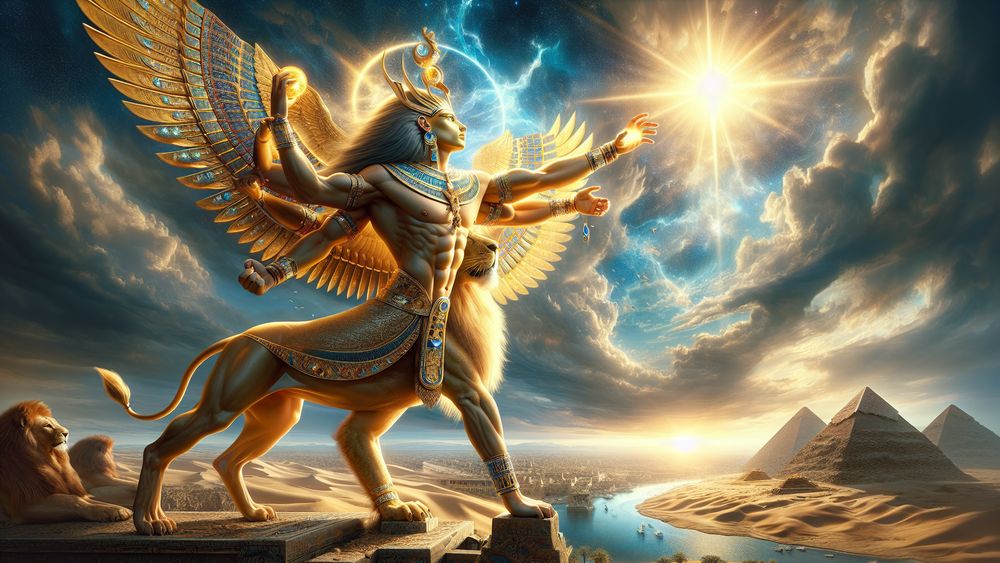
Shu’s role in the Egyptian pantheon, which involves maintaining the separation between sky and earth, is crucial for sustaining life and maintaining balance and order in the universe.
Symbolism and Attributes of Shu
Shu links to a few symbols and attributes. One key symbol is the ostrich feather. He often appears holding it or with it on his head. This feather points directly to air and lightness, which sit at the heart of Shu’s domain as the air god.
Moreover, this feather turns into a symbol for truth and justice within ancient Egyptian culture, which loops back to Shu’s job in keeping ma’at, or the cosmic order. Besides, Shu sometimes gets shown with an ankh, which is the life symbol. This may point to his job as the one who gives life-giving air. In art and religion, these symbols work as visual hints.
They tell of his link with air, light, and his critical role in holding up order and balance in the universe.
- Ostrich Feather: It means air and lightness; it also means truth and justice.
- Ankh: It means life; it may show Shu’s role as the giver of life-giving air.
- Images of Shu: They often show him keeping Nut (the sky) and Geb (the earth) apart, which illustrates his job in keeping the cosmic order.
The Worship and Temples Dedicated to Shu
After we get a clear view of Shu’s symbols and what they mean, it becomes easier for us to understand how and where people in ancient times showed their respect and admiration for him.
How and Where Was Shu Worshipped?
When it comes to honoring Shu, ancient Egyptians didn’t have a single spot where they all gathered specifically for him. Instead, they folded his worship into the larger religious practices that spanned across Egypt. This approach made sense since Shu played a key role in the creation story and was all about keeping the balance in the universe.
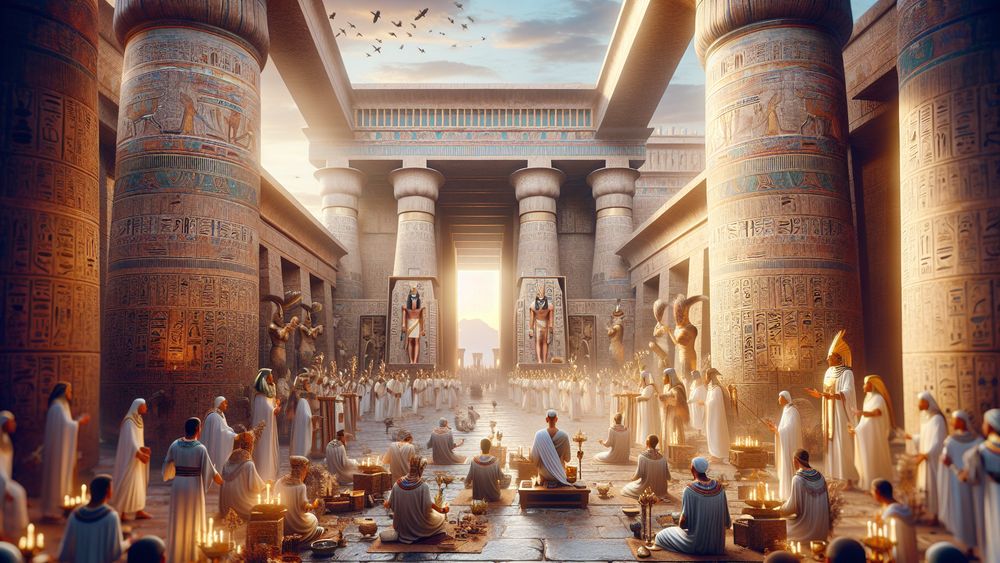
So, rather than heading to a temple built in his name, people would pay their respects to him while visiting the temples of Ra and other gods connected to the creation myth. Here, they performed rituals and made offerings, which was their way of saying thanks for the air and sunlight Shu provided. These elements were vital for their survival, after all.
Thus, while there may not have been a dedicated temple for Shu, his presence was felt everywhere through these acts of worship. It was more about the everyday actions and prayers that included him, which highlighted how essential he was for life and for keeping everything in balance.
The Influence of Shu in Ancient Egyptian Society
In ancient Egypt, people really looked up to Shu. He was a very big part of their culture and how they lived. Because he’s the god of air and sunlight, which are pretty much the basics for life, everyone thought he was super important. They showed him a lot of respect in many ways. For example, artists would often draw him doing his job, which is keeping the sky and the earth apart.
This was their way of saying that keeping everything in balance was key. And for the leaders and pharaohs? They tried to act like Shu since being fair and balanced was seen as the best way to run a place. This idea was so deeply rooted in their beliefs that it touched almost everything they did.
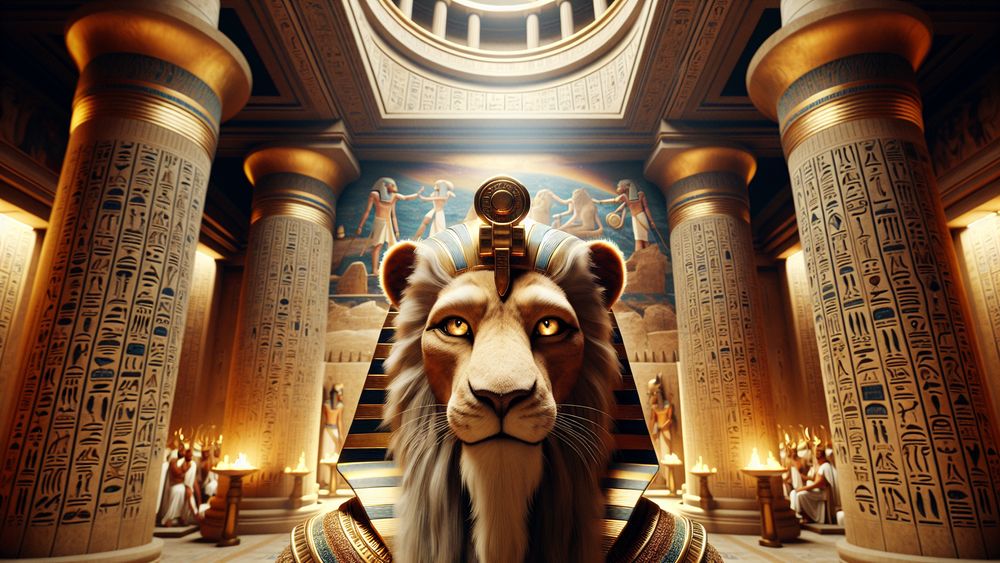
They even did special rituals and gave offerings to Shu, hoping for good weather and crops since that’s directly linked to his area of expertise.
So, when we talk about how Shu influenced society, we see it in:
- Art that showed him doing his thing, which was a constant visual for people about the importance of balance and order.
- Texts where leaders would ask for his help, which showed that even the top folks thought his blessing was crucial.
- Special actions and gifts for Shu, which were all about getting on his good side for the sake of good weather and bountiful harvests.
- Personal items with his mark on them, which people carried around for protection and to feel closer to him.
All these points show that Shu wasn’t just another name in their long list of gods. He had a role that touched almost every part of their lives, from the grand scale of ruling a kingdom to the everyday hopes for sunshine and rain.
Shu’s influence on ancient Egyptian society was immense, seen through art, texts, rituals, and personal items, emphasizing the importance of balance and order in all aspects of life.
Shu in Myths and Relationships with Other Deities
Aside from his impact on society and how people lived their daily lives, Shu also had a key role in the stories and myths that created the culture of ancient Egypt.
Shu in Ancient Egyptian Myths
In the stories that come from ancient Egypt, Shu takes a key spot. He’s the air and light guy, born because Atum (or Ra for some) and Iusaaset decided to combine forces, or because Atum had to sneeze, which depends on which story you hear.
When Shu and his sister Tefnut, who’s all about moisture, show up, it’s like the starting gun for the world to begin. They bring balance and the essentials for life to kick off. Shu’s standout moment? He pushes and keeps Nut (that’s the sky) and Geb (he’s the earth) apart. This move of his makes room for where we all live, which is a pretty big detail if you think about it.
It means day and night and all the seasons can happen. Plus, when Horus and Seth can’t decide who gets to be king and start fighting, Shu jumps in. He’s all about keeping the peace and making sure everything and everyone gets along. This story really shines a light on him being a cosmic and social referee.
His connections run deep in the family tree too. Being Nut and Geb’s dad and having grandkids like Osiris and Isis puts him smack in the middle of a lot of major family drama and stories. His choices ripple through both the godly and human worlds, which is quite the responsibility when you think about it.
The Family of Shu and His Legacy
So, when we talk about Shu and where he fits in the grand scheme of Egyptian mythology, it’s like looking at a family tree that’s more like a who’s who of ancient deities. Shu himself plays a massive part because of his kids and what they go on to do.
He’s the son of Ra, which is no small feat, and then he goes on to have Nut and Geb. This move literally sets the stage for some of the biggest names in Egyptian myths, think Osiris and Isis, and even the somewhat troublesome Seth and Nephthys.
What really makes Shu a standout is his famous act of push and pull, which gets the sky and earth to where they need to be. This isn’t something that people forget easily. It’s a story that sticks because it’s about bringing order and life where there was none before.
Plus, with Osiris and Isis being so crucial later on, especially for pharaohs who see themselves as these gods’ reflections, Shu’s impact is huge. It’s all about keeping the world balanced and making sure everything runs as it should, which, when you think about it, is pretty essential. Table: Shu’s Family Tree and Notable Descendants
| Ancestor | Relation | Notable Descendants |
|---|---|---|
| Ra | Father | |
| Tefnut | Sister | |
| Shu | Self | |
| Nut | Daughter | Osiris, Isis, Seth, Nephthys |
| Geb | Son-in-Law | |
| Osiris | Grandson | Horus |
| Isis | Granddaughter | Horus |
| Seth | Grandson | |
| Nephthys | Granddaughter | Anubis |
So, this table isn’t simply a list.
It’s a snapshot of where Shu sits in the grand narrative and how his actions ripple through generations. It’s clear that without Shu and his knack for keeping the sky and earth apart, the stories that so define Egyptian mythology might look very different indeed.
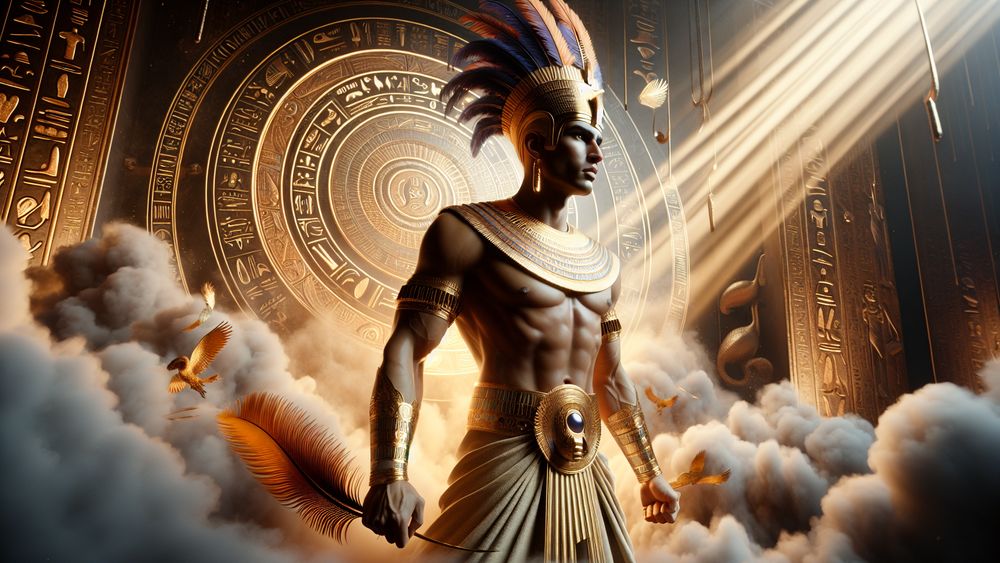
Pantheon of All the Egyptian Mythology Gods
The Egyptian pantheon indeed is a broad and interwoven network of divine beings. They each claim their own realms, narratives, and connections. From those names that ring bells, like Ra and Osiris, to the ones that don’t echo as loudly, this civilization’s belief system indeed presents a varied and in-depth perspective on what’s holy and the overall cosmic setup.
For a detailed look, one should absolutely check out this list of all the Egyptian gods.
FAQs
1. How did ancient Egyptians worship Shu and which rituals were specifically for him?
In ancient times, people in Egypt showed their respect for Shu by engaging in acts of devotion. They did this through giving gifts and speaking words of prayer for the blessings of air and sunlight, which they directly linked to him.
2. What are the most recognizable symbols of Shu and their meanings?
The ostrich feather represents Shu and it means air and lightness. This symbol, indeed, people often link directly to him. They see it and they think of Shu. It’s that simple. Moreover, this feather, for them, carries a lot of weight. Yet, it’s all about being light and airy.
3. Can you explain Shu’s role in the separation of the earth and sky?
In the task where the earth and sky require separation, Shu steps in. He literally grabs the sky and lifts it up. This action creates a gap which, indeed, is where all the air we breathe sits. Thus, he places himself as a pillar, holding the sky away from the earth. It’s his strength that keeps them apart.
And so, by doing this, he ensures that there is space for life to thrive between the ground and the heavens above.
4. How is Shu related to other Egyptian gods and which myths involve him?
Shu, as a key figure, finds himself as Atum’s son and takes on the role of Nut and Geb’s father. He steps into stories where he pulls apart the earth and sky. Also, he jumps into the middle of a fight between Horus and Seth, trying to smooth over their issues.

